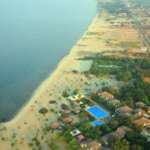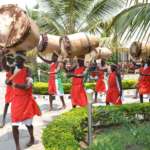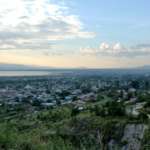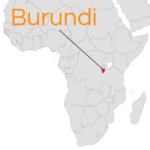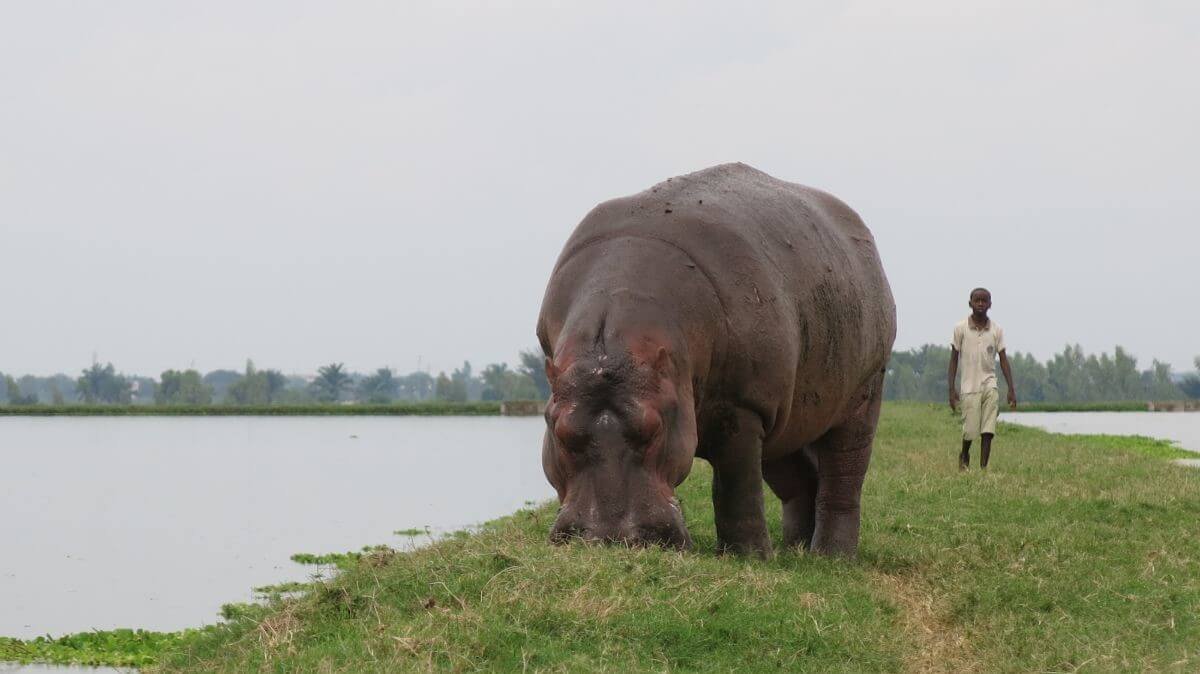A Closer Look at Burundi
Burundi Flag

Burundi Formation Date
November 1, 1962
Burundi Capital Name
is GitegaBurundi is a small, landlocked country located in eastern Africa, bordered by Rwanda, Tanzania, and the Democratic Republic of Congo. The country's capital and largest city is Gitega.
Burundi Neighbours
Exploring Burundi
Introduction
Burundi, located in the heart of Africa, is a small but significant country that often goes unnoticed by the rest of the world. With a rich history, diverse culture, and stunning natural beauty, Burundi has much to offer to those who take the time to explore it. The name "Burundi" is derived from the local language Kirundi and means "land of the brave." As a Cultural Commentator and Travel Writer, I have had the opportunity to discover and appreciate the wonders of this often overlooked nation.Key Takeaways
- Burundi is a small country located in East Africa. - The name "Burundi" means "land of the brave." - It has a rich history and diverse culture. - The country is known for its stunning natural beauty.Geography
Burundi is a landlocked country bordered by Rwanda, Tanzania, and the Democratic Republic of Congo. It is situated on the African Great Lakes region and is known for its breathtaking landscape. The country is home to several physical features such as mountains, valleys, and lakes. Lake Tanganyika, one of the largest lakes in Africa, borders Burundi to the east. The country also has fertile plains that are suitable for agriculture. Some of its natural resources include nickel, gold, copper, and uranium. The climate in Burundi is mostly tropical with two distinct seasons - dry season from June to September and wet season from October to May. The average temperature throughout the year ranges from 20°C to 27°C, making it an ideal destination for travelers seeking warm weather.Origin and History
Burundi has a long and fascinating history that dates back to ancient civilizations. The first inhabitants of the region were hunter-gatherers who later formed small kingdoms. In the 16th century, the region was ruled by the powerful Kingdom of Burundi. In the late 19th century, the country became a German colony and was later colonized by Belgium after World War I. Burundi gained its independence in 1962 and has since experienced political instability and civil war.Government and Politics
Burundi is a presidential representative democratic republic with a multi-party system. The President is both the head of state and government, and is elected by popular vote for a five-year term. The country is divided into 18 provinces, each headed by a governor appointed by the President. Burundi has had a history of political unrest and ethnic tensions, but in recent years, efforts have been made to promote peace and stability in the country. Burundi maintains close relationships with neighboring countries and is a member of several international organizations such as the United Nations, African Union, and East African Community.Commerce and Economy
Agriculture is the main economic sector in Burundi, with over 90% of the population engaged in subsistence farming. The country's main exports include coffee, tea, cotton, and gold. In recent years, there has been an increase in foreign investment in sectors such as mining, telecommunications, and tourism. The official currency of Burundi is the Burundian Franc (BIF), and the country's main trade partners include Tanzania, Kenya, and China.Demographics
Burundi has a population of approximately 12 million people, with a majority living in rural areas. The population is mainly composed of Hutu and Tutsi ethnic groups, with a small percentage of Twa people. French and Kirundi are the official languages of Burundi, with Swahili also widely spoken. The median age in Burundi is 17 years old, making it one of the youngest countries in Africa.Culture
Burundi has a vibrant and diverse culture, influenced by its ancient history and ethnic diversity. The country is known for its traditional art, music, and dance, which are often used to celebrate important events and festivals. One of the most famous cultural festivals in Burundi is the Imuhira Festival, which celebrates the beginning of the agricultural season. Traditional drumming is an essential part of Burundian culture and is often used to communicate important messages.Languages and Religion
French and Kirundi are the official languages of Burundi, with Kirundi being the most widely spoken. Swahili is also spoken by a significant portion of the population. Christianity is the dominant religion in Burundi, with Catholicism being the most prevalent. However, traditional beliefs and practices are still widely followed, especially in rural areas.Education and Healthcare Systems
Education in Burundi is free and compulsory for children between the ages of 7 and 13. However, due to poverty and other social issues, many children do not have access to education. The literacy rate in Burundi is around 62%, with a higher percentage among males than females. The healthcare system in Burundi is still developing, with limited resources and access to medical care. The government has implemented initiatives to improve public health, but there are still challenges in providing adequate healthcare to all citizens.Sports and Recreation
Football (soccer) is the most popular sport in Burundi, with the national team achieving some success in international competitions. Other popular sports include basketball, volleyball, and athletics. The country also has stunning natural landscapes that offer opportunities for hiking, camping, and wildlife viewing.Tourism
Despite its small size, Burundi has a lot to offer to tourists. The country's natural beauty, including its mountains, lakes, and national parks, is a major attraction. Some popular tourist destinations include the Kibira National Park, Lake Tanganyika, and the Rusizi National Park. The country also has a rich cultural heritage, with traditional villages and historical sites to explore.Travel Information for Foreign Visitors
Foreign visitors to Burundi must have a valid passport and visa to enter the country. Visas can be obtained upon arrival at the airport or at the Burundian embassy in their home country. It is recommended to check the latest travel advisories before planning a trip to Burundi, as there may be safety concerns in certain areas. The local currency is the Burundian Franc (BIF), and US dollars are widely accepted. Credit cards are not widely accepted, so it is best to carry cash when traveling in Burundi. The cost of living in Burundi is relatively low, with accommodation, food, and transportation being affordable for most travelers.Quotes
- "African unity and brotherhood is no longer a dream but a necessity." - Julius Nyerere - "The most important thing about Africa is that we should not be forgotten." - Nelson Mandela - "Burundi has always been a country of dialogue and peace." - Pierre NkurunzizaConclusion
In conclusion, Burundi may be a small country, but it has a rich history, diverse culture, and stunning natural beauty that make it a unique and fascinating destination. Despite its challenges, efforts are being made to promote peace and stability in the country. As tourism continues to develop in Burundi, it has the potential to become a must-visit destination for travelers seeking an authentic African experience.Burundi Image Gallery
Burundi Highest Point Name
The highest point in Burundi is Mount Heha (or Mount Hoyo). It is situated in the northern region of the country and rises to a height of 2,684 metres (8,809 feet) above sea level.
Burundi Highest Point Value
2,684 m
Burundi Capital Longitude
Bujumbura is the capital of Burundi and its longitude is 29.36°E.
Burundi Capital Latitude
"Bujumbura, 3.3718° S
Burundi Official Languages
The official languages of Burundi are Kirundi and French. English is also widely spoken.
Burundi Ethnic Groups
The Republic of Burundi is a landlocked African country bordered by Tanzania, the Democratic Republic of Congo, and Rwanda. The country is predominantly populated by the Hutu and Tutsi ethnic groups, who have a long history of both conflict and intermarriage. The Hutu—who primarily inhabit the rural plains—make up about 84% of the population, while the Tutsi—who live primarily in higher-lying areas—comprise the remaining 16%. Both groups speak the national language of Kirundi, although some also speak French. Other ethnic and linguistic minorities in Burundi include the Twa, Nande, Kiga, and Sohlé.
Burundi Religions
The majority of Burundi's population is Christian, with Catholics making up 60% of the population and Protestants making up 15%. Over 20% of the population follows indigenous religions that involve animism and ancestor worship. Muslims comprise 4.5% of the population and there is a small minority of Baha'i followers, primarily in the capital.
Burundi Total Area
Burundi has an estimated total land area of 27,830 km2 (10,745 sq mi).
Burundi Land Area
Burundi has an area of 27,834 square kilometers (10,745 square miles).
Burundi Water Area
Burundi's total water area is approximately 3,115 km². This includes both the internal waters and territorial sea waters of Burundi.
Burundi Total Population
As of July 2020, the total population of Burundi was estimated to be 11,485,113 inhabitants.
Burundi Currency Name
The official currency of Burundi is the Burundi Franc (BIF).
Burundi Currency Code
The currency code for Burundi is BIF.
Burundi Currency Symbol
BIF
Burundi Time Zones
- UTC+02:00
Burundi is in the Central African Time Zone (CAT). UTC+2 is the country’s standard time, with no daylight saving time observed. This means that the country does not shift its clocks forward from Central African Time during the summer months. As such, standard time in Burundi remains the same year-round. This means that throughout the year, the sun rises around 6:00am and sets around 6:00pm.
Burundi Calling Code
The country calling code for Burundi is +257
Burundi Internet TLD
www.aveholidays.bi
How to Say "Burundi" In Different Languages?
- Bengali
- বুরুন্ডি (bn-BD)
- Chinese
- 布隆迪 (zh-CN)
- French
- Burundi (fr-FR)
- German
- Burundi (de-DE)
- Greek
- Μπουρούντι (el-GR)
- Indonesian
- Burundi (id-ID)
- Italian
- Burundi (it-IT)
- Japanese
- ブルンジ (ja-JP)
- Korean
- 부룬디 (ko-KR)
- Latvian
- Burundi (lv-LV)
- Dutch
- Burundi (nl-NL)
- Polish
- Burundi (pl-PL)
- Portuguese
- Burundi (pt-PT)
- Russian
- Бурунди (ru-RU)
- Spanish
- Burundi (es-ES)
- Swedish
- Burundi (sv-SE)
- Thai
- บุรุนดี (th-TH)
- Turkish
- Burundi (tr-TR)
- Vietnamese
- Burundi (vi-VN)
Burundi Popular Holidays
- New Year's Day
- 1 January
- New Year's Address by President Pierre Nkurunziza
- 4 January
- Defense Day
- 18 January
- Mother's Day
- 14 February
- The Carnival
- 17 February (21 February)
- National Peace and Reconciliation Day
- 19 February
- Bujumbura International Airport Reopening
- 19 March
- Feast of the Annunciation of the Lord
- 25 March
- Time Change Day (Daylight Saving Time)
- 31 March
- Good Friday
- 10 April
- Easter Sunday
- 12 April
- Easter Monday
- 13 April
- The Ploughing Season at Gitega
- 20 April (21 April)
- Feast Day of St. Mark
- 25 April
- Labour Day
- 1 May
- Coronation of Mwambutsa IV
- 19 May
- Ascension Day
- 21 May
- The Feast of the Ascension
- 30 May
- Children's Day
- 1 June
- Pentecost Monday
- 1 June
- Ascension of the Lord
- 4 June
- Obligatory National Week of Volunteer Work
- 8 June (10 June)
- Corpus Christi
- 10 June
- Feast Day of St Anthony
- 13 June
- The Festival of River
- 14 June (16 June)
- The International Day of the African Child
- 16 June
- Flag Day
- 17 June
- Feast of the Sacred Heart of Jesus
- 19 June
- Ceremony of delivering the State of the Nation Address by the President of Burundi
- 25 June
- Feast Day of St Peter and St Paul
- 29 June
- The Feast of Mashya
- 30 June (4 July)
- Independence Day
- 1 July
- Eid al-Fitr
- 7 July (8 July)
- Princess Day
- 13 July
- The anniversary of the Battle of Muha
- 13 July
- Feast Day of St. Bonaventure
- 14 July
- Feast of Our Lady of Mount Carmel
- 16 July
- Feast of the Machabees
- 1 August
- The Holy Cross Day
- 3 August
- Eid al-Adha
- 4 August (5 August)
- Feast of the Dedication of the Basilica of St. Mary Major
- 5 August
- Feast of the Transfiguration of the Lord
- 6 August
- Feast Day of St. Lawrence
- 10 August
- Ceremony of delivering the Speech of tradition to the new President of Republic of Burundi
- 11 August
- The Feast of the Assumption of Mary
- 15 August
- Father's Day
- 18 August
- Feast Day of St. Bartholomew
- 24 August
- National Unity Day
- 25 August
- The Feast of the Nativity of Mary
- 8 September
- Feast Day of St. Matthew
- 21 September
- Feast Day of St Francis of Assisi
- 4 October
- The Martyrs' Day Ceremony
- 13 October
- Time Change Day (Standard Time)
- 23 October
- Peace Day
- 24 October
- All Saints' Day
- 1 November
- National Day of Remembrance for Victims of Genocide
- 7 November
- Memorial Day
- 8 November
- National Flag Day
- 16 November
- Feast of the Immaculate Conception of the Blessed Virgin Mary
- 8 December
- International Human Rights Day
- 10 December
- The Feast of the Nativity of Our Lord Jesus Christ
- 25 December
- Christmas
- 25 December
- Feast Day of St. Stephen
- 26 December
- Boxing Day
- 26 December
- St Sylvester's Day
- 31 December


